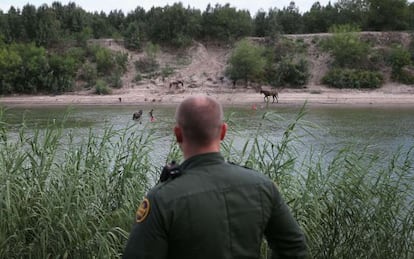Tensions between Mexico and Texas rise over border
Governor of the US state, Rick Perry, slams Mexico for its security failures

Texas Governor Rick Perry is gradually becoming the Mexican government's bête noire. His decision to send the National Guard to the border to stem the flow of immigrants coming into the United States, and his constant criticism of the neighbor country’s security policy, have unleashed the most bitter international controversy the Peña Nieto administration has experienced in recent months. Tensions have escalated and, on Wednesday, Perry sent a venomous letter to the Mexican president accusing him of a “troubling” refusal to recognize the failure of Mexico’s security policies. In the letter, Perry also invited President Enrique Peña Nieto to Texas to see the guards at work.
Mexico responded immediately. The undersecretary for North America, Sergio Alcocer, accused the Republican governor of making “unsubstantiated” accusations. Alcocer took Mexico’s usual line on this issue, saying that the arrival of migrant minors to the border is not a security problem or the fault of a porous border. It is, he said, a humanitarian problem.
The Mexican administration tried to keep its political dispute with Perry – who is in the middle of a campaign to raise his profile ahead of the primaries – separate from the network of commercial ties between the southern state and Mexico. “It’s our top trade partner but the State of Texas is not the Government of Texas,” Alcocer said. This distinction is a key piece of Mexico’s foreign policy. So is its constant effort to keep Perry’s invective from escalating into something more than a neighborly dispute and thus avoid stirring up the dying embers in a country that has never forgotten the loss of a large part of its national territory – including the State of Texas – to the United States in the 19th century.
In his two-page letter, Perry calls for a better “partnership that works collaboratively to address our shared border-security challenges, rather than marginalizing the legitimate views of one side. Our partnership cannot advance if we fail to acknowledge the serious issues associated with lax border enforcement along both of our southern borders.”
Our challenges are partly a consequence of the failure of the Mexican government to secure its southern border”
Although the governor celebrates the cultural and commercial relationship between Mexico and Texas, he strongly criticizes the Mexican government’s handling of border security and points out that drug-related violence has invaded the region and is putting the lives of citizens in danger on both sides.
“Our challenges today are partly a consequence of the failure of the Mexican government to secure its southern border from illegal immigration by unaccompanied children and other individuals from Central America, or to deploy adequate resources to control the criminal element in Mexico,” Perry writes, before calling on President Peña Nieto to “take the necessary steps” to secure the border “in a manner that discourages illicit activities while allowing for legitimate commerce and lawful immigration.”
Governor Perry is one of the Republicans’ potential candidates for the 2016 presidential elections and this humanitarian border crisis – caused by the arrival of thousands of Central American migrant children to the border – has raised his profile in the media.
Last month, Perry ordered the deployment of the National Guard to secure the border. Four hundred soldiers are currently on the ground. The governor has announced plans to deploy as many as 1,000 guards to the region. “I will continue to act as necessary to uphold my constitutional obligations, and when it comes to the safety and security of Texans, I will not be dissuaded by rhetoric of any kind,” he promises in the letter.
Translation: Dyane Jean François
Tu suscripción se está usando en otro dispositivo
¿Quieres añadir otro usuario a tu suscripción?
Si continúas leyendo en este dispositivo, no se podrá leer en el otro.
FlechaTu suscripción se está usando en otro dispositivo y solo puedes acceder a EL PAÍS desde un dispositivo a la vez.
Si quieres compartir tu cuenta, cambia tu suscripción a la modalidad Premium, así podrás añadir otro usuario. Cada uno accederá con su propia cuenta de email, lo que os permitirá personalizar vuestra experiencia en EL PAÍS.
En el caso de no saber quién está usando tu cuenta, te recomendamos cambiar tu contraseña aquí.
Si decides continuar compartiendo tu cuenta, este mensaje se mostrará en tu dispositivo y en el de la otra persona que está usando tu cuenta de forma indefinida, afectando a tu experiencia de lectura. Puedes consultar aquí los términos y condiciones de la suscripción digital.








































